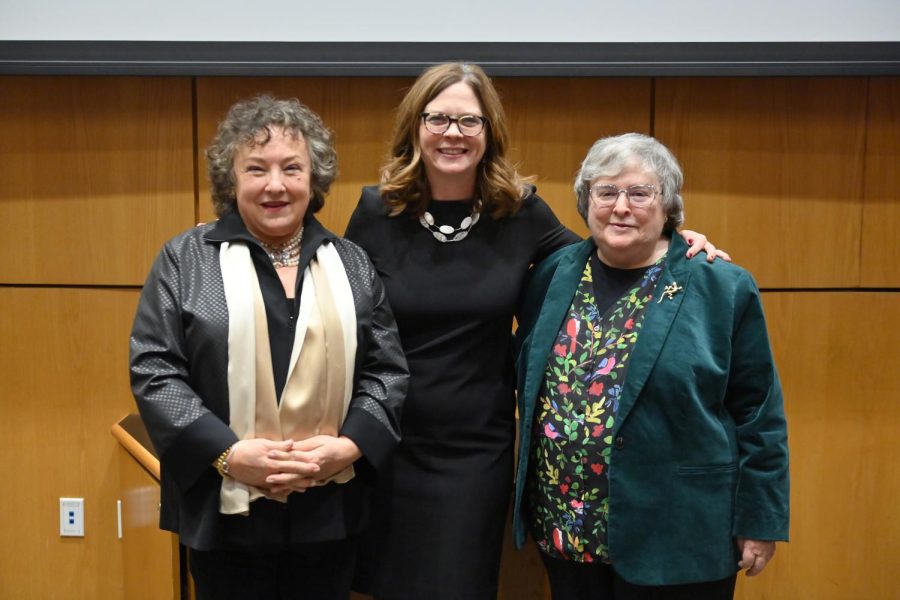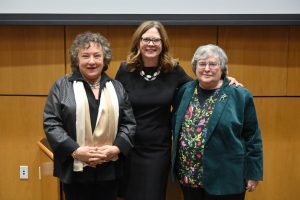Fordham Theology Department Unveils New Fund To Aid Climate Change Efforts
The Elizabeth A. Johnson, C.S.J., Endowed Fund for Theology and the Earth aims to oppose climate change from a theological perspective
COURTESY OF DANA MAXSON VIA FORDHAM NEWS
University President Tania Tetlow, J.D., attended the launch event for the endowment fund.
March 23, 2023
Fordham University’s department of theology hosted a lecture on March 21 during which they unveiled the Elizabeth A. Johnson, C.S.J., Endowed Fund for Theology and the Earth. The fund, established in the name of former professor of theology at Fordham Elizabeth Johnson, C.S.J., aims to further research in climate change and human beings’ relationship with the planet as well as the natural world from a theological perspective. The event took place at the Lincoln Center campus’ McNally Amphitheater with a reception that followed in Platt Court.
Christine Firer Hinze, chair of the theology department and a professor of theological ethics at the university, began the event by introducing all of the speakers: Johnson; Jason Z. Morris, professor of biology; and Michael Pirson, James A.F. Stoner endowed chair in global sustainability at the Gabelli School of Business.
Hinze also thanked Margaret Sharkey, School of Professional and Continuing Studies ’15, for her generous donation to help develop the fund. Hinze referenced Sharkey’s experience in the beauty industry when expressing her gratitude for her contribution.
The fund’s organizer also called on everyone to recognize that all living things have significance and that humans and creatures must live symbiotically in our shared home because every creature was created by God.
“Instead of beautifying people, Margaret is now using her resources to beautify the planet,” she said.
Following the introductory remarks, Johnson led the launch lecture and spoke on the fund’s timeliness. She highlighted that the initiative is necessary as a result of humans disregarding the millions of other species inhabiting Earth.
“Due to human action and inaction, the world is warming,” Johnson said.
She also noted the importance of incorporating theology as a study in the conversation regarding climate change. According to Johnson, efforts to care for the Earth are multiplying, and she added that although they are often faced with obstacles, the solution to their approach is theology.
In her speech, Johnson drew reference to literature authored by Catholic scholars such as Thomas Aquinas’ “Summa Theologica” and Pope Francis’ “Laudato Sí.”
The fund’s organizer also called on everyone to recognize that all living things have significance and that humans and creatures must live symbiotically in our shared home because every creature was created by God.
“We humans need to rethink our relationship with nature and all its creatures,” she said. “We all flourish or wither together.”
Johnson blamed human participation in and an indifference toward climate change on “the hierarchy of being,” a Greek philosophical idea entrenched in religious and secular thought. The hierarchy of being highlights humans at the top, deeming them the most important beings on Earth, and considers all other aspects of the natural world to fall below them.
She denounced this hierarchy and also attributed the elitist culture to it. Johnson noted that it made people’s “minds drunk on human supremacy” and led to unbridled exploitation of the natural world.
Johnson named the remedy to these problems: a theology that depicts all creatures coming directly from God, with none being more important than another.
“The antidote to human hubris is a robust creation theology.” former professor of theology at Fordham Elizabeth Johnson, C.S.J.
“The antidote to human hubris is a robust creation theology,” she said.
Following Johnson’s speech, Hinze invited the two Fordham professors to respond to the lecture and converse about the fund. Morris and Pirson spoke on the trouble Earth is in and the dangers of climate change.
Morris, coming from a perspective of science and Judaism, concurred with Johnson on her view of the relationship between theology and climate change. Pirson, coming from a nontheological point of view — rather one of economics and global sustainability — agreed with both of the other panelists, stating how important it is for people of every background to care about climate change.
The event was then opened to the audience to ask questions to the panel, which consisted of Hinze, Johnson, Morris and Pirson. One attendee asked the panelists what they suggested Fordham should do in order to aid in ending the climate crisis.
Pirson responded by noting that hosting conversations and funds similar to the lecture that was being held for the endowed fund was a “great start.” Johnson also suggested investing university funds into ecological initiatives.
Hinze concluded the event by calling for a ban on single-use plastics at the university.
“There is no issue that matters more to us as a Catholic institution than care for the Earth and Laudato Sí.” University President Tania Tetlow, J.D.
The event drew a diverse audience of students, faculty and the general public. People of different ages and backgrounds came together to hear Johnson and the other panelists speak on climate change and the new fund.
The event was followed by a reception which took place in Platt Court. A number of attendees were present including students and faculty. University President Tania Tetlow, J.D., was also at the event and stated how important care for the environment is to Fordham.
“There is no issue that matters more to us as a Catholic institution than care for the Earth and Laudato Sí,” she said. “Given that we are in New York, Fordham has the chance to step up to the plate to have a unique impact on saving the planet, so every way we can possibly do that matters enormously.”
AnnaMarie Pacione, Fordham College at Rose Hill (FCRH) ’26, echoed Johnson’s sentiment that all creatures are God’s creations the same way humans are. Pacione emphasized that this way of thinking was a “good reminder” and not often said.
“I appreciated the dialogue between theology, ecology and business and a multi-pronged approach to climate justice that allows for a collaborative response.” Jack Reilly, FCRH ’23
“She stated several times that we are siblings and kin with the bears and with creation as a whole,” Pacione said. “We all do belong to each other and that intrinsic commitment and obligation to be of justice for creation itself.”
Jack Reilly, FCRH ’23, praised the event’s panel for having a diverse group of individuals, each from different disciplines and fields of study, come together to discuss climate justice.
“I appreciated the dialogue between theology, ecology and business and a multi-pronged approach to climate justice that allows for a collaborative response,” he said.













